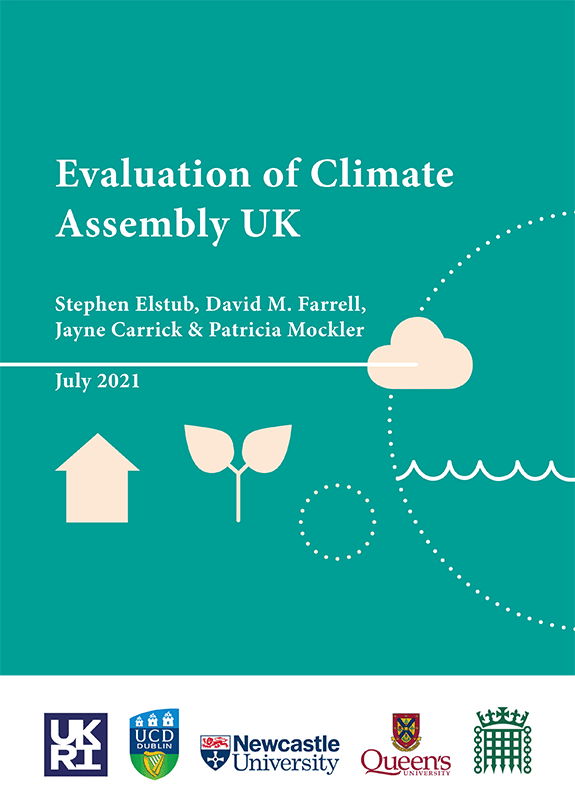Climate assemblies for democratic climate action
Written by Jelaine Gan & Sheena Davis
19 February 2024
In a wrap
- Climate assembly is a useful tool to engage the public with climate change and ecosystem resilience
- Dr. Stephen explores how these assemblies can be designed, implemented, and integrated better into policy and governance in different parliaments.
- Popularity of climate assemblies is growing, but its trajectory can go both ways – become impactful when integrated into policymaking or fade away as a trend.
The CCER is often linked with natural sciences, but we sometimes forget that people play a central role to both the causes and solutions to climate change. It has become increasingly obvious that we need a large-scale system change to slow (and maybe even stop) our slide towards an unhospitable future. This is why we need social scientists to be part of the conversation.
Dr. Stephen Elstub is a professor in a fancy sounding field – democratic politics – that probably went over our heads at first (and even second) reading. He sits at the research helm of the School of Geography, Politics, and Sociology at Newcastle University.
Stephen is a believer of democracy. He studies the theory of how democracy should be operating and how it can be improved. After delving into theories, he has now moved towards empirical research on the key theme of improving deliberation and participation in the democratic process. He explores democratic innovations — processes and mechanisms that reimagine and enhance the role of citizens in governance. These innovations aim to create a government that is more inclusive and responsive to its citizens.
Citizens’ assemblies
Much of Stephen's research revolves around citizens’ assemblies. These involve bringing in a random sample of the public, presenting them key information about an issue and asking them to deliberate and then formulate policy recommendations. They originated from mini publics that were previously organized by civil societies or as part of some social experiments aimed at gauging public opinion.
In response to the climate change crisis, citizens’ assemblies have been increasingly convened to address questions related to climate change, climate action and response. They are gaining popularity right across Europe and more recently in other regions too.
Stephen collaborates closely with practitioners who design and implement these assemblies. He worked with different parliaments (UK Parliament, Scottish Parliament and the German Bundestag Parliament) on how they can effectively make best use of citizens’ assemblies or similar participatory approaches. Some parliaments have expressed interest to integrate citizens’ assemblies more permanently, a move contingent on having robust evaluation methods. The Organisation for Economic Co-operation and Development (OECD) has produced set guidelines for evaluation of citizens’ assemblies, which was heavily influenced by Stephen’s work. He researched whether the past climate assemblies have been run well, without bias, and more importantly under what circumstances can they have an impact, if any. What do politicians think of the results?

Engaging the public
According to Stephen, enhancing public engagement with the development of climate policy, if done well, can strengthen the society’s ability to both adapt to the climate emergency, but also to mitigate its impacts.
“Top-down approach to climate action and response just isn't going to work”, he remarked.
He argues that the public must be actively involved and in agreement for them to comply with changes in lifestyle and policy. While there is a shared understanding that urgent action is needed, there's less consensus on the specific actions required and the urgency attached to them. Climate assemblies can help in gathering public opinion and values, as these inputs will underpin climate policies that are acceptable and democratic.
The move from doing normative democratic theory to empirical research was a real challenge for me.…. I've done it through collaboration and the only way I could have done it is through working with talented people who understand different research methods much better than me.
I've learnt an enormous amount from those collaborations, and it's still been a massive, steep learning curve for me to learn while doing the actual projects - how to use these different methods and how to combine them all.…… And so, if I went back in time and to tell myself as a PhD student doing political theory, that I would be leading these projects, empirically investigating all these different processes around the world, I wouldn't believe it. That has definitely been a challenging and a really rewarding part of the journey.

It (involvement in climate assemblies) goes back a few years when I was working on the paper and I'm making a case of why I thought mini publics could be combined well with parliamentary committees. The UK Parliament was advertising a fellowship scheme, so I put in this application saying I'd work on this idea. I wasn't really expecting them to go for it, but I thought there's no point second guessing. But anyway, it was good timing, 'cause it was something that they were kind of thinking about themselves when it came in. They were really keen to work with me. So, I spent about 8 months in total of going to Parliament a couple of days a week and working with the Citizen Engagement Unit there on doing this. And then similarly, the Scottish Parliament was also interested in this, and so I then spend a year working with them. They've done some pilots and I evaluated those.
There was no master plan. It just really has snowballed from one engagement to another. All of these kept me in this area and along this track.
What are your predictions for your field in the future?
I've been saying previously that we've seen this quite rapid expansion of citizens’ assemblies and similar processes in general, but specifically citizens’ assemblies on climate or climate assemblies as often been called right across and even beyond Europe. I think that's going to continue for the next few years.
So far, these processes have just being one off ad-hoc events and there are problems with that because it can just be too easy to ignore. Like a tool for a politician just to use but then ignore it and put it aside. What we're also starting to see is action to bring them into more permanent bodies where they perhaps get a bit more credibility, a bit more attention, and it becomes harder for politicians to just ignore them when they want to……. Looking beyond that, it's really hard to tell because this could just be a trend, just the fashion at the moment and then in a few years’ time, everyone moves on to something else, drops this idea, and is trying something else. That's certainly a possibility, and that wouldn't surprise me if that happened. But if they do get the permanent aspect, they'll obviously be harder to get rid of and it could then be the start of a new type of institution that's here to stay that's going to become a regular feature of different political systems around the world.
Either those two latter trajectories, I think, are possible. And right now, it's very difficult to difficult to say which way it will go.
Please see here to contact Dr Elstub
